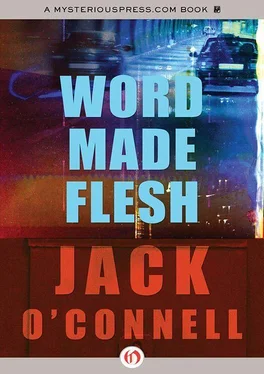“Why were you waiting in my cab?” Gilrein yells.
“Inside,” Lacazze answers. “And bring the gun.”
The station house is a definition of chaos. It has evolved beyond its standard of extreme clutter and into the domain of the ruined. File cabinets have been overturned and their contents spread like fertilizer over every square inch of floor space. Some of the piles of paper have been saturated with water. Possibly with urine. Others are covered with perfect black bootprints that, when combined, resemble a set of instructions for an elaborately complicated dance routine. There are trails of vermin droppings here and there. Some graffiti artist has had a party on the walls, spraying can after can of Day-Glo and metallic colors, looping and curving and slashing lines of paint into letters, symbols, pictograms, doodles, everything but intelligible words, then crossing out the bulk of the drawing and starting over again on top of the previous layer, painting over the paint.
There are also dozens, maybe hundreds of bullet holes in the walls. One desk is covered with mud and silt and dried leaves. Another desk has a fire axe protruding from its surface, the blade imbedded in the wood up to the handle. And then, in contrast to this, there is Ceil’s desk, left neat as the last night she sat behind it, preserved as a shrine, everything in order, pencils still sitting in a coffee mug that advertises LOFTUS FUNERAL HOMES, reference books lined up along the outer lip, a green blotter occupying the center. And a framed photo of Gilrein, a small candid shot that depicts a content man seated on the edge of his bed in the perfect bungalow. Only someone has altered the photo, defaced it, taken a black marker and drawn onto the picture, making round glasses over the eyes, filling in a pointed goatee on the chin, blacking out the two front teeth. And fixing horns at the top of the skull. Gilrein refrains from touching the picture; instead, he leans down and sniffs at the desktop, smelling the aroma of a recently applied lemon polishing agent.
They move past Geil’s desk, walk to the door of the Inspector’s office. The interrogation chamber. The place were the ritual of Methodology was performed. A piece of scrap paper is tacked to the door. It features Ceil’s handwriting, or, more likely, a bad imitation of Ceil’s handwriting, that reads
ESCHATOLOGY SQUAD COMMANDER
KNOCK BEFORE ENTERING
and beneath this someone has added, with the dry sarcasm that was one signature of Ceil,
THEN ABANDON ALL HOPE.
The Inspector unlocks and opens the door and Gilrein follows him inside. If it’s possible, Lacazze’s office is even more chaotic than the squad room. It’s as if the chamber were trying to transmute itself into a small municipal dumping ground. The interrogation blackboard has been knocked over and its backing mirror is shattered, slivered glass sprayed everywhere like foam on the crest of a frozen wave. Random holes have been gouged into the plaster, each about the size of a fist. One wall displays an abbreviated piece of writing that’s illegible and could just be a line of smeared blood. Every one of the paper stacks and file towers has been knocked over, covering the floor with a thicket of yellowed reams. The room smells like a lavatory that has never been properly cleaned. There are also traces of burned gunpowder, alcohol, and a cloying hint of dying vegetation.
They sit on opposite sides of Lacazze’s desk, the red chalice in front of Gilrein, the crystal decanter, half-filled, as always, with Spanish sherry, in front of the Inspector. The only other thing on the desktop, spread beneath the chalice like a blotter, is a crumpled and partially wet tabloid-style newspaper.
Lacazze raises the heavy glass bottle to his lips and says, “To your health.”
Gilrein picks up the red chalice and brings it to his mouth, then glances inside and sees fat globules of an oozing white substance refusing to mix with what must be the dregs of some sherry.
“Is it consecrated?” Gilrein asks.
Lacazze breaks off his swallow and comes forward in his seat as if he’s about to choke. He manages a hard gulp before barking out a laugh, then rubs away the dripping sherry with the back of his newly grotesque hand. Gilrein notices some of the pustules are bubbling slightly.
“Didn’t you hear?” Lacazze says, voice weak and raspy, but his tone mildly sarcastic. “I’ve been stripped of my powers.”
“Secular or spiritual?”
“Forgive me,” Lacazze says, “but those two always confuse me.”
“I’ll bet. Ceil used to say that as a cop you made a terrifying priest—”
“She had such a way with the langauge.”
“—or maybe it was the other way around.”
“I suppose we’ll never know,” Lacazze says, then takes another drink, more moderate this time, and adds, “but what do you think she meant by that?”
Gilrein crosses his arms and stares at the old man.
“I think she meant you had all the best equipment for either job,” he says, “but none of the empathy they both require.”
“Empathy,” Lacazze repeats, as if only for the sound of the word. “From the Greek empatheai , meaning affection or passion.”
“If you say so.”
“What I say, once again, is that your knowledge of your late wife is lacking.”
Gilrein holds back another outburst. What he’d like to do is go over the desk and plant the decanter in the bastard’s skull. What he does instead is take a breath, lower his voice and say, “That’s why I’m here, right? That’s why I followed you inside.”
Lacazze seems to study him for a few seconds.
“Drink up, Mr. Gilrein,” the Inspector finally says. “Wine loosens the tongue. That’s what we need here tonight. Free discourse between rivals.”
“Are we rivals, Inspector?”
“We have always been rivals, Mr. Gilrein.”
“And what is it we’re competing for?”
Lacazze frowns at him as if the answer were beneath them both.
“What all men fight over,” he says. “Their own view of the world and the love of a good woman.”
Gilrein tenses up in spite of himself.
“The woman in question,” he says, “is dead.”
“Exactly,” Lacazze says. “And since the day she died, you and I have both been living a series of lies. And those lies have been consuming us slowly, haven’t they, Gilrein?”
“I don’t know, Inspector. I’m not the one with the sores all over my hands and my mouth.”
“But it’s early yet.”
The comment makes Gilrein decide to go on the offensive.
He sits forward on the interrogation stool, leans on his knees and says, “I was a bunko cop for a long time, Inspector. And I never understood why Ceil couldn’t see that underneath all your bullshit voodoo you were nothing but a lowlife fucking con man.”
This brings another unexpected laugh. Lacazze covers his face with his pus-swollen hands for a moment and leans back in his chair. When he takes his hands away all trace of amusement has disappeared, replaced by a disgusted and maybe pitying look.
“How did Ceil bear it?” he asks. “Taking her brilliance home every night to such an inferior partner. It must be regarded as an act of mercy. On top of everything else, the woman was a saint. Damien to the brain-addled. Mother Teresa to the feeble-minded—”
“Sorry, Inspector, but I find it hard to believe that you can’t think of a better way to spend your final hours than insulting a feeble-minded cabdriver.”
“—Not a saint, a martyr. Sacrificing herself on this lowbrow cross. Giving up her genius to this Golgotha of stupidity.”
“Lacazze.”
“Prostituting herself to a pathetic livery boy,” the Inspector yells, “who couldn’t even make it in bunko. Bunko! My God, what was she thinking?”
Читать дальше












